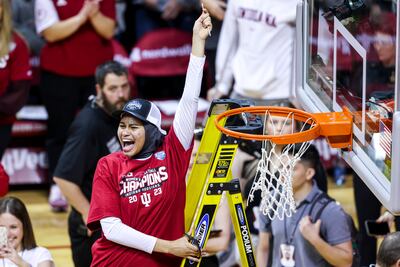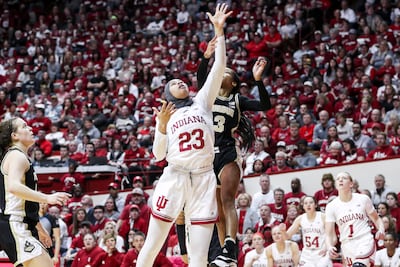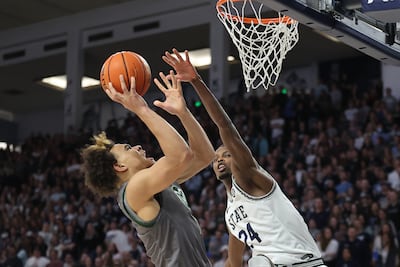For the past month, hundreds of America’s top basketball players have been competing in the men's and women's March Madness competitions, one of America’s biggest annual sporting events.
Many of them have been doing so all while fasting from sunrise to sunset for Ramadan.
For Mali-born Adama Sanogo, a star player for University of Connecticut’s UConn Huskies, beating the University of Arkansas minutes before iftar – having fasted all day for the first day of Ramadan – was nothing new.
“I do this for a long time. I’m used to it now. I’ve been doing it since I was in high school,” he told CT Insider from the team’s locker room in Las Vegas.
“It’s definitely important. I believe in my faith. As a Muslim, if you’re healthy you have to do it.”
Despite it being 14 hours since water or food had passed his lips, Sanogo scored 18 points on his team’s way to a 88-65 win.
Three days later, UConn demolished Gonzaga University to reach this weekend's Final Four competition in Houston, Texas, with Sanogo scoring 10 points.
He isn’t alone.
Two other players on the vaunted men’s UConn basketball team, Hassan Diarra and Samson Johnson, are observing Ramadan as they compete to become national champions this weekend.
Kansas State, which reached the last eight of the men’s competition before bowing out last weekend, has two star Muslim players, Abayomi Iyiola and Ish Massoud, among their ranks, with Iyiola fasting for Ramadan.
These college stars aren’t the only athletes currently mixing top-level basketball with fasting from sunrise to sunset.
As the National Basketball Association (NBA) enters a crucial stage of its season before the playoffs next month, players such as Kyrie Irving and Jaylen Brown, as well as former player Enes Kanter Freedom, are known to fast during Ramadan.
Scientists say that as the body adjusts to the change in eating and sleeping patterns, the physical and mental effects are thought to be minimal, even for athletes placing major demands on their bodies.
One such player is Kiandra Browne. On Tuesday, the women’s college basketball star put in a “really rough” training session.
That’s despite her Indiana Hoosiers team having been knocked out of March Madness last week.
“Every Ramadan I’ve worked out and trained while fasting. Last summer I did a lot [of fasting] with the way training was scheduled. Fasting and competing is not alien to me,” the Canadian forward told The National.

She said that while a lot of the general public may break their Ramadan fast with oily food, that’s not something she can do.
“I make sure I’m getting lots of protein, I stay away from anything fried. I steam rice. I drink a lot of water during the night and this year, I started using DripDrop [an electrolyte drink] a bit,” she said.
“It makes me a bit thirstier, but it has the electrolytes I need.”
For suhoor, she has a meal of protein oatmeal, eggs, cucumbers and dates. “As an athlete, I need to fuel my body like an athlete,” she said.
Indiana were expected to go deep in the women’s tournament this month and had that happened, Browne planned to break her fast mostly with dates.
“I was going to hoard a bunch of water to be sure to have enough at night, and to have enough food in my hotel room,” she said. “Everybody else was going to eat at a different time so I wanted to make sure I had stuff when I needed to fuel myself.”

Browne believes she trains better when fasting. “I’m not eating or drinking at all [during the day] but I feel perfectly fine. I think God makes it easy for me,” she said. “I believe there is no let-off in my performance.”
With Ramadan moving forward 10 days on the Gregorian calendar in 2024, next year will likely result in a greater number of Muslim athletes fasting while taking part in March Madness. Aly Khalifa, the 210cm-tall Egyptian who plays for the Charlotte 49ers, is likely to be one.
Another is likely to be Muzamil ‘Zee’ Hamoda, the 200cm star player from Bahrain.
This month, Hamoda, who has represented Bahrain at under 16 and under 18 levels, played an integral role in Utah State’s season-long drive to attaining the number 1o seeding for March Madness.
While the team were eliminated in the first round, days before the start of Ramadan, Hamoda said that in the past, much of his pre-season training work has taken place while simultaneously fasting for Ramadan.
There’s one activity, he says, that he’s not particularly looking forward to as plans for next year’s tilt at a March Madness crown.
“Running,” he told The National. “I found that running was the hardest thing to try to do when I’m fasting.”

!['As a Muslim, if you’re healthy you have to [fast],' says Adama Sanogo, pictured here in action against the Gonzaga Bulldogs in Las Vegas, Nevada. Getty / AFP](https://www.thenationalnews.com/resizer/v2/V4F77Y2UXIJK37VFZCDSA7CQP4.jpg?smart=true&auth=16661ac0dd1c0ad86df395ebbe3ca12c8e35bce611fa050dba3c42368b00fe9d&width=400&height=225)
